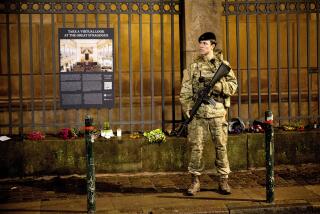Drawing a blank
- Share via
CONTRARY TO THE FERVENT HOPES of radical Islamists, the deadly protests over a handful of cartoons published in a Copenhagen newspaper last fall have not brought Denmark to its knees. Quite the opposite. The fiery imam who helped spark the violence has left the country in a sulfurous huff, and the pro-U.S., center-right government has been strengthened.
Denmark is still feeling the effects of what Prime Minister Anders Fogh Rasmussen called its worst international crisis since World War II, but they’re hardly earth shattering. The country is busily trying to repair relations with the Arab world, and a boycott of Danish goods in several Middle Eastern countries, though mostly ended, is still causing some economic pain. Denmark-based Arla Foods, Europe’s second-largest dairy company, recently announced that the boycott would cost at least $65 million this year. But that won’t do much damage to an economy that has seen slow but steady annual growth recently.
The fuss arose in January in reaction to cartoons depicting the prophet Muhammad that were published in the daily Jyllands-Posten in September. Although the cartoons sparked some minor local protest at the time they were published, not until Ahmed abu Laban and a group of other radical Danish Muslim leaders went on a Middle Eastern hate-mongering tour in December, saying depictions of the prophet were blasphemous, did the controversy take off. Danish embassies were burned and dozens of people were killed in protests in the Arab world.
Beset by criticism in Denmark, Laban announced last month that he was leaving for the Palestinian territories. “I could have provoked a revolt, created hell in Denmark, led Muslims to react violently, but did not do so,” he said, apparently wanting to be congratulated because the death and destruction he fomented were limited to the Mideast. Rasmussen, meanwhile, a key U.S. ally who arrived at Camp David for a visit with President Bush on Friday, is stronger than ever.
The protests helped focus political debate on a topic long overdue for serious discussion: better integrating Denmark’s 200,000 Muslim immigrants. Even by European standards, the country’s unemployment rate among non-Western Muslim men is high. One reason: Ironically, Denmark may be too generous. Its liberal policies and wide social safety net may heighten the alienation of Muslim immigrants, who often find it so easy to get government handouts that they have little incentive to look for work.
Denmark’s moderate Muslims seem to be benefiting from the unrest. Naser Khader, a Syrian-born member of parliament interested in peaceful integration, is a rising political star. And last week, Muslims in Denmark’s second-largest city said that the cartoon flap had helped unite them behind a long-stalled mosque project. In the end, a crisis that threatened to split the country could help draw it closer.
More to Read
Sign up for Essential California
The most important California stories and recommendations in your inbox every morning.
You may occasionally receive promotional content from the Los Angeles Times.










